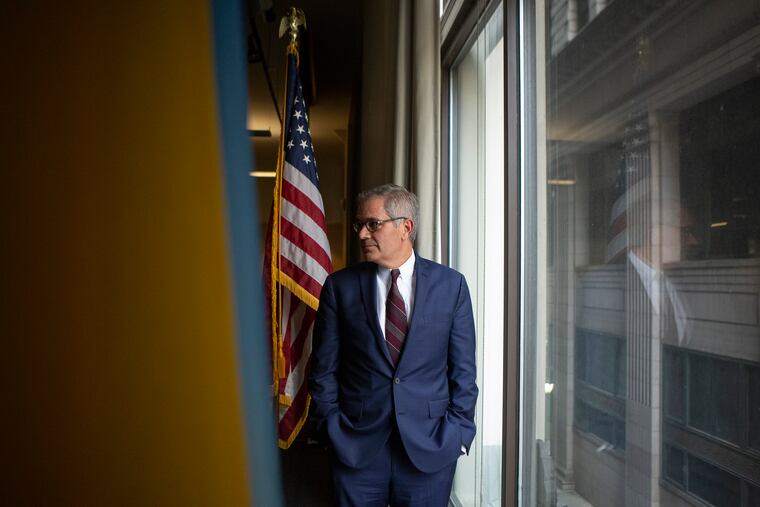In Philly courtroom where DA Krasner won’t try cases, he’s called to witness stand
The judge happened to be Scott DiClaudio, who has been at war with Krasner since April, when the District Attorney filed motions in all of DiClaudio’s cases, seeking to disqualify him.

On Monday morning, Philadelphia District Attorney Larry Krasner, who previously practiced as a civil rights and criminal defense attorney for 30 years, found himself in an unaccustomed corner of the courtroom: the witness stand.
“This way, Mr. Krasner,” the judge said, having to redirect him as he walked toward the lawyers’ podium.
The judge happened to be Scott DiClaudio, who has been at war with Krasner since April, when the district attorney filed motions in all of the cases before DiClaudio, seeking to disqualify him. In the motions, the district attorney alleged there was an appearance of conflict because DiClaudio’s girlfriend, a former assistant district attorney, had filed a discrimination complaint against the office. “That made Mr. Krasner feel some kind of way,” DiClaudio said in court recently. DiClaudio denied the motions to recuse, which are under review by Superior Court.
Since then, the Philadelphia Common Pleas Court judge has on several occasions sought futilely to compel Krasner to defend the motions in his courtroom — where the business of administering justice has ground nearly to a halt, as the District Attorney’s Office will not enter into plea agreements there or agree to allow the judge to preside over trials. (“I love the dysfunction,” one defense lawyer muttered loudly Friday, when his planned trial before the judge was postponed after the district attorney demanded a jury instead.)
Most recently, on Friday, DiClaudio sought to summon the district attorney to address the case of Phillip Rivera, a defendant who was subject to a traffic stop that led to criminal charges when police allegedly found a gun in his car.
Rivera stood to benefit from a recent state Supreme Court decision, Commonwealth v. Perfetto, that upended numerous cases when the court ruled that since Philadelphia moved its scandal-plagued Traffic Court under the umbrella of Municipal Court, it was essentially placing a defendant in illegal double jeopardy when it prosecuted him separately for a traffic violation and for other criminal charges that stemmed from the same incident. In stops where a traffic ticket was issued and criminal charges filed, the ruling appeared to offer a get-out-of-jail card for anyone who paid the ticket before the criminal case was resolved. “We certainly recognize that our holding today may present the Philadelphia District Attorney’s Office with an administrative challenge,” the court wrote in its opinion.
Krasner said in an interview that his legal team had devised a successful solution: invite defendants to give up the double-jeopardy claim and proceed in state court, “or if they choose not to do that and persist in their Perfetto claim, then we’re going to send it" to the U.S. Attorney’s Office for federal prosecution.
“We were facing all of these cases being impossible to prosecute, through no one’s fault but through a significant change in the law, and we’ve been able, in a way that’s evenhanded and fair, to resolve this,” he said.
But those offers were not available in DiClaudio’s courtroom. DiClaudio called that a “miscarriage of justice and a due process violation” — and he wanted Krasner to answer for it.
Finally, the district attorney appeared under force of subpoena on Monday in a different matter, after DiClaudio agreed to hold a hearing on a petition from Anthony Scarlett, a client from Krasner’s days as a defense lawyer, alleging Krasner had not effectively represented him. Since the District Attorney’s Office had to remove itself from the case, the commonwealth was represented by a lawyer from the state Attorney General’s Office, which has recently been in public conflict with the district attorney.
“We’ve taken the position that there’s no basis for a hearing,” Deputy Attorney General Carson Morris said. Such post-conviction filings are frequently dismissed without hearings in Pennsylvania. But, DiClaudio said, “until you hear testimony, it’s impossible to make a decision."
Scarlett’s case, ironically, involved a car stop much like the one in the Perfetto case, where Scarlett was stopped for a traffic violation and a search revealed a gun, ammunition, and marijuana. Scarlett claimed Krasner was ineffective for failing to file a motion to suppress the evidence arising from what he said was an illegal search. Krasner said, given the evidence available, such a motion “was a 95% to 98% loser, depending upon the judge." Krasner advised Scarlett that a guilty plea was “the only viable strategy.” But after he was also caught selling two pounds of marijuana while out on bail, DiClaudio sentenced him to five to 10 years in prison.
DiClaudio appeared to lose patience with Scarlett and his attorney, who sought to argue that there was no traffic violation leading to the police stop because no ticket was issued.
DiClaudio held the decision under advisement. And, in the case of Rivera, who had also been stopped in a car with a gun and had actually received a traffic ticket, he allowed the district attorney to withdraw charges, clearing the way for federal prosecution.
He also finally got to question Krasner about the matter. Sort of.
Krasner said that in light of the pending appeal over DiClaudio’s disqualification, he was “uncomfortable” discussing the matter. He said his concern was that questions over DiClaudio’s fairness could fuel Post-Conviction Relief Act (PCRA) petitions in any case resolved in his courtroom.
“It will be important to avoid a huge pile of PCRAs,” Krasner said